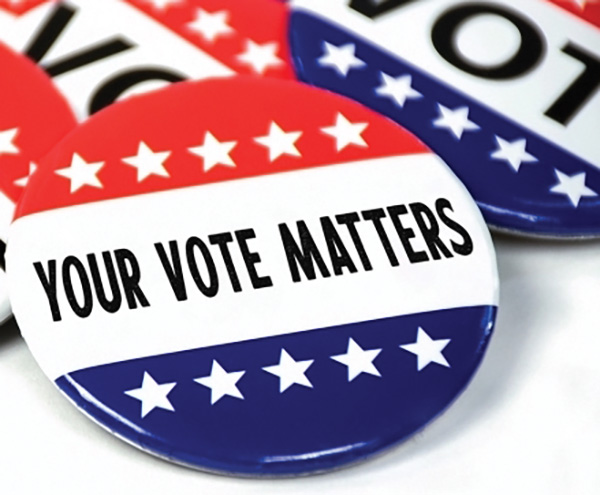Black History
Who Says Black Voters Won’t Turn Out In November?

By Rosaland Tyler
Associate Editor
New Journal and Guide
Rumors abound that more Blacks will either vote for Trump in 2024, or refuse to turn out in massive numbers to vote in the November 2024 presidential election.
But historians will tell the real story as they have told for years about 1966 in Selma, Ala.
Blacks in Selma voted for the first time in 1966, defeating Selma Sheriff Jim G. Clark Jr., a strict segregationist who famously wore a “Never” button and frequently used cattle prods and billy clubs to stop Black voting-rights protesters, including civil rights leader C.T. Vivian.
Before Selma’s historic 1966 election was held, about 1 percent of Blacks in Selma were registered to vote. According to rumors, Black voters would not turn out to vote. Turns out, it only took a small percentage of Black voters to stop Clark from serving another term as Selma’s sheriff.
In other words, Selma’s historic 1966 election brings the past and the present sharply into focus.
“You can keep the club in your hand, but you cannot beat down justice,” Vivian told reporters after Clark punched him in the mouth at a February 1965 voting rights protest, which was held on the steps of the Dallas County courthouse.
Clark also blocked Vivian’s path into the building and turned his back. But Vivian said, “You can turn your back on me, but you cannot turn your back upon the idea of justice. We will register to vote, because as citizens of these United States we have the right to do it.”
Vivian, who was arrested multiple times and suffered several brutal beatings at the hands of officers throughout the South, received the 2013 Presidential Medal of Freedom, before he died at age 93 in 2020.
Vivian said in a NPR interview the same year that he won the award, “Do what you can do and do it well,” he said.
If Clark, the bigoted Selma sheriff, puts a human face on Trump and also symbolizes the leverage that Black voters not only held during Selma’s 1966 election but will also wield during the November 2024 election– disregard today’s rumors. This is what Black voters can do well right now, in other words. Black voters can recall past triumphs and Clark is one example.
Clark, the Selma sheriff, not only lost his 1966 reelection bid. He became a mobile home salesman. In 1978, he and six others were indicted by a federal grand jury in Montgomery on charges of conspiring to smuggle marijuana. Clark was convicted and spent about nine months in prison, The Associated Press reported. He died at age 84 in 2007, in a nursing home, in Elba, Ala, after suffering a heart attack and a stroke that decreased his mobility to the point that he needed a motorized wheelchair to get about and had little energy. It was tough for him to walk a few steps by himself.
Still, Clark said he never regretted his actions.
He said in a 2006 interview with the Montgomery Advertiser. “Basically, I’d do the same thing today if I had to do it all over again.” Clark, who served as sheriff of Selma from 1955 to 1966, added, “I did what I thought was right to uphold the law.”
What can Blacks do well right now?
Trump is being tried as a defendant in numerous election interference trials nationwide. Trump is also hosting political rallies that are growing increasingly hostile and are filled with profanity.
Trump recently addressed a group of major GOP donors at Mar-a-Lago. During his 90-minute “profanity-laced speech” that compared the Biden administration to Nazi Germany, according to CNN, “He cursed while criticizing special counsel Jack Smith and other prosecutors who have charged him with committing crimes.”
The best thing Black voters can do now is reflect on Trump’s real and demonstrated legacy.
We can remember how Trump deliberately insulted Myeshia Johnson in 2017. You may recall she was the Black grieving widow who was on her way to the airport to collect the remains of her husband, Army Sgt. La David Johnson, when she received an insulting phone call from the White House. Trump told the widow, “Well, I guess he knew what he was getting into.”
The slain soldier’s mother, Cowanda Jones-Johnson, later told reporters, “President Trump did disrespect my son and my daughter and also me and my husband.”
Worse, in 2018, Trump referred to Haiti and African nations as “sh-thole countries” during a meeting with a bipartisan group of senators.
One year later, in 2019, Trump said four Congresswomen of color should “go back and help fix the totally broken and crime infested places from which they came.”
Most recently, Trump said at a campaign rally, “The Black people like me for my felony charges.”
Jasmine Harris, director of Black media for Biden-Harris, told the Grio in a February 2024 interview, “Donald Trump has been showing Black Americans his true colors for years: An incompetent, anti-Black tyrant who holds us to such low regard that he publicly dined with white nationalists a week after declaring his 2024 candidacy.”
Right now, the best thing Blacks can do well, is, well, recall how Black voters determined the outcome of Clark’s failed reelection bid for sheriff of Selma in 1966. Black voters can also recall how they went to the polls and helped Jimmy Carter, Bill Clinton, Barack Obama and Joe Biden win the presidency.
Black voters, in other words, are a muscular political force and one of the most intensely courted constituencies, due to the fact that this voting bloc continues to leverage election outcomes.
While rumors suggest more Black voters will either vote for Trump or they will not turn out in large numbers in November to vote for Trump or Biden, history will make the final call.